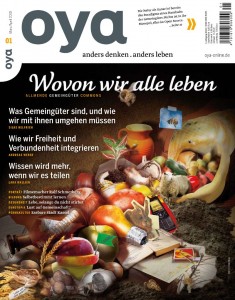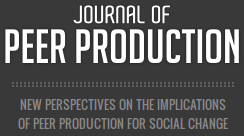 [Repost aus »Oya – anders denken. anders leben«, Nr. 01/2010, PDF-Download, Lizenz]
[Repost aus »Oya – anders denken. anders leben«, Nr. 01/2010, PDF-Download, Lizenz]
Von Lara Mallien
Wissen und das Licht haben viel gemeinsam: Wir sprechen von Erleuchtung, vom Geistesblitz, von erhellenden Einsichten. Das Licht wird nicht weniger, gleich, ob zehn oder tausend Menschen es zum Bräunen oder zum Gartenbau nutzen. Hier enden die Gemeinsamkeiten, denn das Wissen nimmt sogar zu, je mehr es geteilt wird, je mehr Wissende und Mitdenkende, Weiterdenkende es gibt. Wie die Freude ist auch das Wissen eines dieser geheimnisvollen Gemeingüter, die sich vermehren, wenn wir sie teilen.
Wissen und Erkenntnis teilen sich mit. Selbst wenn etwas unausgesprochen bleibt, liegt es auf seltsame Weise in der Luft. Auch bei großen Erfindungen ist das so: Die Glühbirne, die Nähmaschine, das Telefon – sie wurden von mehreren Menschen an mehreren Orten beinahe zeitgleich in die Welt gebracht. Streng genommen gehören noch viel mehr Menschen zu den Urhebern, denn jede Erfindung markiert nur die Spitze eines Eisbergs von Wissen, das unzählige Menschen in den Jahren zuvor zusammengetragen haben. Basiert nicht die Glühbirne auch auf dem alten Wissen der Glasbläser?
(mehr …)
 A lot of people want to „overcome“ capitalism, but what do they mean by it? Michel Bauwens from the P2P Foundation gave a short note on that topic, which could be interesting to discuss here: Is it really post-capitalist (also see the critique on reciprocity licences)? Here’s the text:
A lot of people want to „overcome“ capitalism, but what do they mean by it? Michel Bauwens from the P2P Foundation gave a short note on that topic, which could be interesting to discuss here: Is it really post-capitalist (also see the critique on reciprocity licences)? Here’s the text:

 Silke Helfrich vom
Silke Helfrich vom 
